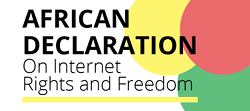The UN General Assembly's 73rd session passed a record number of resolutions relevant for internet policy. This article outlines developments in the First Committee, relating to international norms in cyberspace, and the Third Committee, covering a range of internet-related human rights issues.
This interview explores the gender implications of setting up a community network in the remote areas of the Philippines – from tackling gender stereotypes to the distribution of labour to the benefits of access for a community that is ignored by telecommunications companies.
Organisers hope to raise public awareness, empower people to speak of their struggles in exercising their human rights online and mobilise more people to call for the immediate attention of the Myanmar government in upholding human rights online and offline.
 FIRN: Feminist Internet Research Network
FIRN: Feminist Internet Research Network
The Feminist Internet Research Network is a three-and-a-half-year collaborative and multidisciplinary research project led by APC, funded by the International Development Research Centre. The project draws on the study “Mapping research in gender and digital technology”, and the Feminist Principles of the Internet collectively crafted by feminists and activists, primarily located in the global South.
 All Women Count: Take Back the Tech!
All Women Count: Take Back the Tech!
All Women Count: Take Back the Tech! is a four-year project from 2017 to 2020 being coordinated by APC’s Women's Rights Programme under the All Women Count consortium. The consortium’s concern is violence against women, in particular violence experienced by women, girls and trans* people at risk.
This project aims to address the following questions: Are local access infrastructure models a viable alternative to connecting the unconnected, and if so, what are the circumstances that make them successful? What are the benefits to the local community in terms of well-being, gender equity and social or economic development where connectivity infrastructure is locally owned?
 Take Back the Tech!
Take Back the Tech!
Take Back the Tech! is a call to everyone, especially women and girls, to take control of technology to end violence against women. It is a global, collaborative campaign project that highlights the problem of tech-related violence against women, together with research and solutions from around the world. Take Back the Tech! leads several campaigns at various points in the year, but our biggest annual campaign takes place during 16 Days of Activism Against Gender-Based Violence (25 Nov - 10 Dec).
For this year's Take Back the Tech, One World Platform (OWP), based in Bosnia and Herzegovina, used videos to highlight the concerns, ideas and experiences of local activists. We had the chance to catch up with OWP's Aida Salihovic to hear about the campaign and discuss issues of online gender-based violence in the country.
Here's a list of things to watch out for during your edit-a-thon, including the safety of your participants and how to navigate the tricky but sometimes essential rules of editing content on Wikipedia.
Strict adherence to inflexible copyright laws would stifle the influence this music has on individuals, families and the communities they would want to sing them to and the films we want to make about them.
Columns

Inside the Information Society
David Souter writes a weekly column for APC, looking at different aspects of the information society, development and rights. David’s pieces take a fresh look at many of the issues that concern APC and its members, with the aim of provoking discussion and debate. Issues covered include internet governance and sustainable development, human rights and the environment, policy, practice and the use of ICTs by individuals and communities.

The internet of memory: Stories from the APC community
What were information and communication technologies like in the 1980s and 1990s? What are the stories of the genesis and evolution of non-profit computer networks working for social change? Twice a month, this section will take a historical look at the APC community's journey of internet activism and make links to where we are now. Join Jennifer Radloff in this retrospective trip exploring the connections between the past and the present.
This report highlights the different aspects of tech-related violence against women in Uganda, their implications and solutions proposed, with the aim of addressing this growing concern.
This report is a thematic exploration of tech-based, women-led startups, aiming to map the growing nature of women’s interventions in the tech-based business industry and the overall impact on other women in the workforce.
We are writing to ask you to ensure that Google drops Project Dragonfly and any plans to launch a censored search app in China, and to re-affirm the company’s 2010 commitment that it won’t provide censored search services in the country.
This research has been conducted to help different stakeholders understand how the corporate sector is currently responding to its data protection responsibilities in Pakistan.
7amleh – The Arab Center for the Development of Social Media and the Swedish Kvinna till Kvinna Foundation published a comprehensive research report on the phenomenon of gender-based violence in social networks and the internet, the first of its kind in Palestine and the region.
On 19 November 2018, EDRi, together with 53 other NGOs, including APC, sent a letter to the Council of the European Union. The letter draws attention to the ongoing concerns regarding the proposal on copyright in the Digital Single Market, ahead of a crucial meeting on 23 November.
The undersigned civil society organizations, call on Facebook to provide a mechanism for all of its users to appeal content restrictions, and, in every case, to have the appealed decision re-reviewed by a human moderator.
The 43 country reports and eight thematic reports in this year's GISWatch focus on community networks, defined as “communication networks built, owned, operated, and used by citizens in a participatory and open manner.”






















